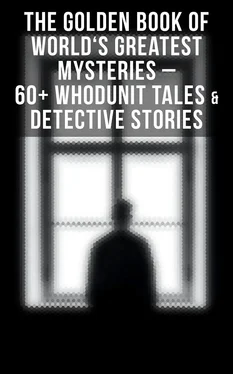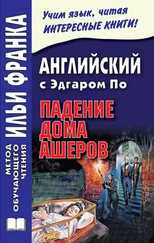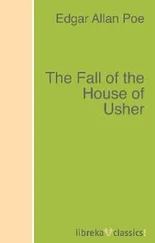"It is merely," I said, "an identification of the reasoner's intellect with that of his opponent."
"It is," said Dupin; "and upon inquiring of the boy by what means he effected the thorough identification in which his success consisted, I received answer as follows: 'When I wish to find out how wise, or how stupid, or how good, or how wicked is anyone, or what are his thoughts at the moment, I fashion the expression of my face, as accurately as possible, in accordance with the expression of his and then wait to see what thoughts or sentiments arise in my mind or heart, as if to match or correspond with the expression.' This response of the schoolboy lies at the bottom of all the spurious profundity which has been attributed to Rochefoucauld, to La Bruyère, to Machiavelli, and to Campanella."
"And the identification," I said, "of the reasoner's intellect with that of his opponent depends, if I understand you aright, upon the accuracy with which the opponent's intellect is admeasured."
"For its practical value it depends upon this," replied Dupin; "and the Prefect and his cohort fail so frequently, first, by default of this identification, and, secondly, by ill-admeasurement, or rather through non-admeasurement, of the intellect with which they are engaged. They consider only their own ideas of ingenuity; and, in searching for anything hidden, advert only to the modes in which they would have hidden it. They are right in this much, that their own ingenuity is a faithful representative of that of the mass; but when the cunning of the individual felon is diverse in character from their own the felon foils them, of course. This always happens when it is above their own, and very usually when it is below. They have no variation of principle in their investigations; at best, when urged by some unusual emergency, by some extraordinary reward, they extend or exaggerate their old modes of practice without touching their principles. What, for example, in this case of D——, has been done to vary the principle of action? What is all this boring, and probing, and sounding, and scrutinizing with the microscope, and dividing the surface of the building into registered square inches; what is it all but an exaggeration of the application of the one principle or set of principles of search, which are based upon the one set of notions regarding human ingenuity, to which the Prefect, in the long routine of his duty, has been accustomed? Do you not see he has taken it for granted that all men proceed to conceal a letter, not exactly in a gimlet-hole bored in a chair-leg, but, at least, in some out-of-the-way hole or corner suggested by the same tenor of thought which would urge a man to secrete a letter in a gimlet-hole bored in a chair-leg? And do you not see, also, that such recherchés nooks for concealment are adapted only for ordinary occasions, and would be adopted only by ordinary intellects; for, in all cases of concealment, a disposal of the article concealed, a disposal of it in this rechercé manner, is, in the very first instance, presumable and presumed; and thus its discovery depends, not at all upon the acumen, but altogether upon the mere care, patience, and determination of the seekers; and where the case is of importance, or, what amounts to the same thing in the policial eyes, when the reward is of magnitude, the qualities in question have never been known to fail. You will now understand what I meant in suggesting that, had the purloined letter been hidden anywhere within the limits of the Prefect's examination,—in other words, had the principle of its concealment been comprehended within the principles of the Prefect,—its discovery would have been a matter altogether beyond question. This functionary, however, has been thoroughly mystified; and the remote source of his defeat lies in the supposition that the Minister is a fool, because he has acquired renown as a poet. All fools are poets; this the Prefect feels; and he is merely guilty of a non distributio medii in thence inferring that all poets are fools."
"But is this really the poet?" I asked. "There are two brothers, I know; and both have attained reputation in letters. The Minister, I believe, has written learnedly on the Differential Calculus. He is a mathematician and no poet."
"You are mistaken; I know him well; he is both. As poet and mathematician, he would reason well; as mere mathematician, he could not have reasoned at all, and thus would have been at the mercy of the Prefect."
"You surprise me," I said, "by these opinions, which have been contradicted by the voice of the world. You do not mean to set at naught the well-digested idea of centuries? The mathematical reason has long been regarded as the reason par excellence ."
"'Il y a à parier,'" replied Dupin, quoting from Chamfort, "'que toute idée publique, toute convention reçue, est une sottise, car elle a convenue au plus grand nombre.' The mathematicians, I grant you, have done their best to promulgate the popular error to which you allude, and which is none the less an error for its promulgation as truth. With an art worthy a better cause, for example, they have insinuated the term 'analysis' into application to algebra. The French are the originators of this particular deception; but if a term is of any importance, if words derive any value from applicability, then 'analysis' conveys 'algebra' about as much as, in Latin, ' ambitus ' implies 'ambition,' ' religio ' 'religion,' or ' homines honesti ' a set of honourable men."
"You have a quarrel on hand, I see," said I, "with some of the algebraists of Paris; but proceed."
"I dispute the availability, and thus the value of that reason which is cultivated in any especial form other than the abstractly logical. I dispute, in particular, the reason educed by mathematical study. The mathematics are the science of form and quantity; mathematical reasoning is merely logic applied to observation upon form and quantity. The great error lies in supposing that even the truths of what is called pure algebra are abstract or general truths. And this error is so egregious that I am confounded at the universality with which it has been received. Mathematical axioms are not axioms of general truth. What is true of relation, of form and quantity, is often grossly false in regard to morals, for example. In this latter science it is very usually untrue that the aggregated parts are equal to the whole. In chemistry, also, the axiom fails. In the consideration of motive it fails; for two motives, each of a given value, have not, necessarily, a value, when united, equal to the sum of their values apart. There are numerous other mathematical truths which are only truths within the limits of relation. But the mathematician argues from his finite truths, through habit, as if they were of an absolutely general applicability, as the world indeed imagines them to be. Bryant, in his very learned Mythology , mentions an analogous source of error when he says that 'although the pagan fables are not believed, yet we forget ourselves continually and make inferences from them as existing realities.' With the algebraists, however, who are pagans themselves, the 'pagan fables' are believed, and the inferences are made, not so much through lapse of memory as through an unaccountable addling of the brains. In short, I never yet encountered the mere mathematician who could be trusted out of equal roots, or one who did not clandestinely hold it as a point of his faith that x²+px was absolutely and unconditionally equal to q . Say to one of these gentlemen, by way of experiment, if you please, that you believe occasions may occur where x²+px is not altogether equal to q , and, having made him understand what you mean, get out of his reach as speedily as convenient, for, beyond doubt, he will endeavour to knock you down.
Читать дальше












